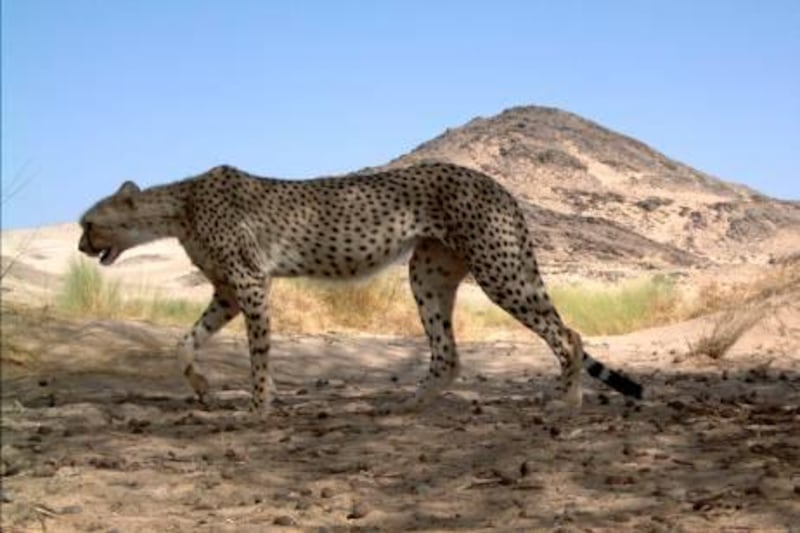DUBAI //A conservationist has called for a campaign to raise awareness of the devastation of cheetah populations in the wild by the illegal trade in cubs.
Dr Mordecai Ogada spoke days after a young cheetah was found wandering the streets of Al Karamah in Abu Dhabi.
He said the big cats were a popular choice among wildlife collectors in the UAE and most were well looked after by their owners.
"Captive cheetahs in the UAE are mostly loved and cared for at great expense," said Dr Ogada, the East African co-ordinator of a cheetah conservation programme. "I am certainly not interested in condemning and alienating those people. I think that, through education, we can translate their love for cheetahs into support for conservation."
Dr Ogada, speaking from Nairobi, said the cruelty was generally on the part of smugglers: "They capture cubs and put them in boxes with no water or food for hours or days."
The conservationist visited the UAE this year to discuss his plans with the International Fund for Animal Welfare (Ifaw) at its regional office in Dubai.
He also had an informal meeting with a Dubai Government authority.
His proposals include building a database of all captive and pet cheetahs in the UAE, and their owners.
“We would inform people about the threats to cheetahs in the wild and the negative impacts of cub trafficking on wild populations,” he said. “It would be an exciting step if we could get these owners together into a forum, or cheetah club, which could raise funds for, or sponsor, wild cheetah conservation and research and organise trips to go and see wild cheetahs in Africa.
“The club would also provide expert advice and veterinary information on how to keep captive cheetahs as healthy and happy as possible.”
The cheetah is listed by the Convention on International Trade in Endangered Species as being threatened with extinction, and trade in the animals is illegal except in very unusual circumstances.
Dr Ogada said the species had already become extinct in more than 20 countries, and the illegal trade in cubs was putting pressure on populations already under stress and could push smaller, marginal and fragmented populations to extinction.
“Cheetah mothers may be killed when protecting the cubs, increasing the damage the trade does to wild populations.
“The problem is widespread across the Gulf, but the UAE features more prominently because it is a more cosmopolitan and open society than other countries in the region.
“Cheetahs domesticate completely and become friendly pets when captured young. This is why they are popular, because they can be kept at home without a cage and are not a danger to people.
“Lions, leopards and tigers do not domesticate completely and remain a constant danger.”
Dr Ogada’s initiative was welcomed by Ayesha Kelaif, an Emirati who runs the Dubai Animal Rescue Centre at Al Barsha.
“It would be a great idea because there are so many people who want these animals and definitely they need to be educated. I have heard of so many people keeping them as pets in unauthorised enclosures. Some people keep them in bathrooms.
“I think there’s a lot of trafficking going on. As an animal lover I think they should be in the wild; they are wild animals and I would always support them being left in their natural habitat.”
An advert on a UAE classified website this week offers three cheetah cubs for sale in Dubai and features a photo of the tiny animals. The advert says: “They shall come along with all the necessary documents.”
Dr Ogada said: “I think the ‘necessary documents’ is based on the fact that there is some legal trade in cheetahs from South Africa. The actual numbers brought in to the UAE are very small, but their presence makes it very easy to ‘launder’ cubs that are illegally brought in to the country.”
An Emirati man was arrested at Bangkok airport on his way to the UAE last month after sedated wild animals were found in his baggage. There were no cheetahs, though the authorities recovered four leopard cubs.
A carnivore ecologist, Dr Ogada helps East African states to develop and implement action plans to conserve the cheetah.
His project is part of a programme set up jointly by the Wildlife Conservation Society and the Zoological Society of London. More details are available at www.cheetahandwilddog.org.
Next month he and his colleagues are linking up with Ifaw and the Djibouti government to hold an intergovernmental training workshop on trafficking in Djibouti. The aim is to help the authorities to stem the flow of wild cheetah cubs from Africa to the Middle East.
csimpson@thenational.ae





